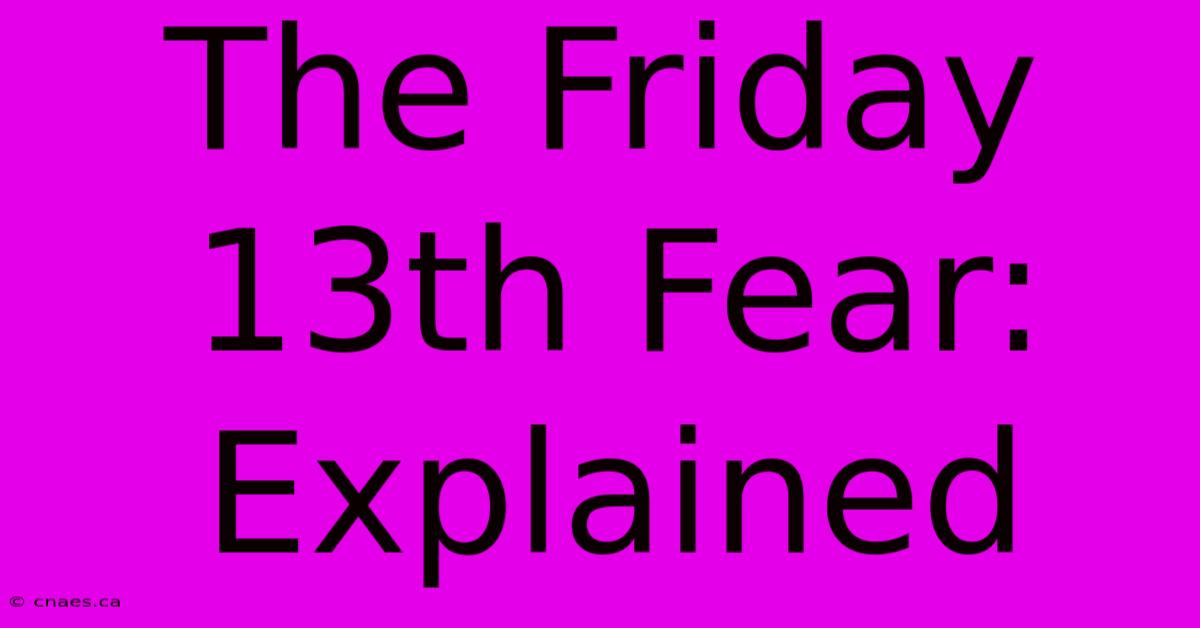The Friday 13th Fear: Explained

Discover more detailed and exciting information on our website. Click the link below to start your adventure: Visit My Website. Don't miss out!
Table of Contents
The Friday the 13th Fear: Explained
Friday the 13th. Just the phrase conjures images of black cats, broken mirrors, and a general sense of unease. But why? Why does this particular date hold such a potent grip on our collective psyche, sparking fear and superstition in so many? Let's delve into the fascinating history and psychology behind this pervasive phobia.
The Roots of Triskaidekaphobia and Paraskevidekatriaphobia
The fear of Friday the 13th isn't a single phobia, but rather a combination of two:
- Triskaidekaphobia: The fear of the number 13.
- Paraskevidekatriaphobia: The fear of Friday the 13th.
While the exact origins remain shrouded in mystery, several historical and cultural factors contribute to these phobias.
Biblical and Mythological Influences
Some trace the fear of the number 13 back to the biblical Last Supper, where 13 individuals were present before the betrayal and crucifixion of Jesus. This event cemented the number 13 as ominous in many Christian traditions. Mythological associations also play a role, with Norse mythology featuring Loki, the trickster god, as the 13th guest at a feast that ended in tragedy.
Historical Accidents and Coincidences
Throughout history, significant negative events occurring on Friday the 13th have likely reinforced the superstition. While correlation doesn't equal causation, these occurrences contribute to the perceived link between the date and misfortune. The sheer number of coincidences, however unintentional, has helped solidify the Friday the 13th superstition in popular culture.
The Psychology of Fear: Why Friday the 13th Matters
The fear isn't solely rooted in history. Psychology plays a crucial role:
Confirmation Bias
People tend to remember events that confirm their pre-existing beliefs. If someone believes Friday the 13th is unlucky, they're more likely to notice and recall any negative experiences on that day, reinforcing their fear. Positive events are often overlooked or dismissed.
The Power of Suggestion
The widespread awareness and discussion surrounding Friday the 13th create a self-fulfilling prophecy. The anticipation of bad luck can lead to increased anxiety and caution, potentially resulting in more accidents or misfortunes – inadvertently proving the superstition right.
Anxiety and Stress
For some, Friday the 13th triggers a more general anxiety or stress response. This heightened state of alertness can make individuals more susceptible to negative experiences, creating a vicious cycle of fear and self-doubt.
Overcoming Friday the 13th Anxiety
While the fear might seem irrational, its impact on mental well-being is real. If Friday the 13th causes significant distress, consider these strategies:
- Challenge your thoughts: Actively question the validity of your fears. Remind yourself that it's just a date.
- Practice mindfulness: Focus on the present moment to reduce anxiety.
- Engage in relaxing activities: Spend time doing things you enjoy.
- Seek professional help: If the fear is severely impacting your life, consider therapy or counseling.
Conclusion: Embracing Rationality Over Superstition
Friday the 13th remains a fascinating cultural phenomenon, a testament to the power of superstition and the human tendency to seek patterns even where none exist. By understanding the psychological and historical underpinnings of this fear, we can move beyond simple superstition and embrace a more rational approach, transforming apprehension into a day like any other. Remember, it's just a date; don't let fear dictate your reality.

Thank you for visiting our website wich cover about The Friday 13th Fear: Explained. We hope the information provided has been useful to you. Feel free to contact us if you have any questions or need further assistance. See you next time and dont miss to bookmark.
Also read the following articles
| Article Title | Date |
|---|---|
| The Friday 13th Fear Explained | Dec 14, 2024 |
| Europes Shore Power Market Growth | Dec 14, 2024 |
| Pritchards 27 Points Fuel Celtics Win | Dec 14, 2024 |
| Champions Death At 69 | Dec 14, 2024 |
| Leicester Boss Recalls Newcastle | Dec 14, 2024 |
